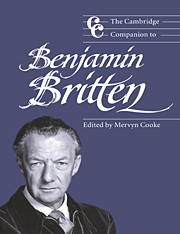Book contents
- Frontmatter
- Introduction
- Part one Apprenticeship
- 1 Juvenilia (1922–1932)
- 2 Britten, Auden and ‘otherness’
- 3 Britten in the cinema: Coal Face
- Part two The operas
- 4 ‘He descended into Hell’: Peter Grimes, Ellen Orford and salvation denied
- 5 The chamber operas
- 6 Gloriana: Britten's ‘slighted child’
- 7 Britten and Shakespeare: A Midsummer Night's Dream
- 8 Eros in life and death: Billy Budd and Death in Venice
- Part three Perspectives
- Part four The composer in the community
- Notes
- Index of Britten's works
- General index
7 - Britten and Shakespeare: A Midsummer Night's Dream
from Part two - The operas
Published online by Cambridge University Press: 28 September 2011
- Frontmatter
- Introduction
- Part one Apprenticeship
- 1 Juvenilia (1922–1932)
- 2 Britten, Auden and ‘otherness’
- 3 Britten in the cinema: Coal Face
- Part two The operas
- 4 ‘He descended into Hell’: Peter Grimes, Ellen Orford and salvation denied
- 5 The chamber operas
- 6 Gloriana: Britten's ‘slighted child’
- 7 Britten and Shakespeare: A Midsummer Night's Dream
- 8 Eros in life and death: Billy Budd and Death in Venice
- Part three Perspectives
- Part four The composer in the community
- Notes
- Index of Britten's works
- General index
Summary
Britten's A Midsummer Night's Dream is undoubtedly the most successful Shakespearean opera to employ Shakespeare's original text as the sole basis for its libretto. The choice of a pre-existing text was partly a pragmatic response to the composer's decision to write (at comparatively short notice) a full-scale opera to celebrate the opening of the newly refurbished Jubilee Hall at the Aldeburgh Festival in June 1960, and the opera's music was composed within the astonishingly short space of nine months. The task of adapting Shakespeare involved the judicious shortening of the play to around half its original length and presented the composer with a number of challenging dramatic problems. Britten stressed the importance of faithfulness to the original literary source in an interview published a few days before the opera's first performance on 11 June 1960. Shakespeare's Dream, however, conveniently provided him with an unusual degree of narrative flexibility on account of its continuous action, reflected in the First Quarto edition of 1600 by the complete absence of act or scene divisions. The plot develops by juxtaposing self-contained groups of characters; and because both lovers and rustics are ignorant not only of each others' existence but also of the fairies' presence, certain aspects of dramatic sequence are rendered relatively unimportant.
Shakespeare's play is set within a symmetrical frame provided by static scenes at the Athenian court, with Theseus and Hippolyta removed from the action and unaffected by the magic of Oberon – although it is implied that their marriage cannot take place until the dispute between Oberon and Tytania is resolved. Theseus's judicial pronouncement on Hermia initiates many of the complications exacerbated by the supernatural powers at work in the wood, and his nuptials provide the ceremonial conclusion to which the activities of all the characters progress.
- Type
- Chapter
- Information
- The Cambridge Companion to Benjamin Britten , pp. 129 - 146Publisher: Cambridge University PressPrint publication year: 1999
- 3
- Cited by

